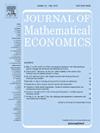论从 "是否知道 "算子出发的 "不知道 "结构的公理化
IF 0.7
4区 经济学
Q3 ECONOMICS
引用次数: 0
摘要
本文表明,在一个广义的无意识状态空间模型中,当且仅当代理人的知识满足真理公理(Truth Axiom)时,代理人的基础知识就可以从她的 "是否知道 "算子中公理化出来:只要代理人知道某个事件,该事件就成立。如果代理人知道某个事件或知道其否定,那么她就知道该事件是否成立。如果知识是真实的,那么不同的知识运算符会导致不同的 "是否知道 "运算符。反之,对于任何一个 "是否知道 "算子,都有一个唯一的真知识算子来诱导给定的 "是否知道 "算子:当且仅当代理人知道事件是否成立且事件确实成立时,她才知道该事件。定性或概率信念可能无法从 "是否相信 "中恢复。本文用 "是否知道 "将知识和常识的属性公理化。本文的主要贡献如下。首先,在概念上,本文提供了一个关于知识和不知道的广义状态空间模型,其中关于知识的唯一假设就是真理公理。其次,在实践上,本文提供了一种构建广义状态空间模型的简单方法。本文章由计算机程序翻译,如有差异,请以英文原文为准。
On the axiomatization of an unawareness structure from knowing-whether operators
This paper shows that, on a generalized state space model of unawareness, an agent’s underlying knowledge is axiomatized from her knowing-whether operator if and only if her knowledge satisfies the Truth Axiom: whenever the agent knows an event, the event holds. The agent knows whether an event obtains if she knows it or knows its negation. Different knowledge operators lead to different knowing-whether operators if knowledge is truthful. Conversely, for any knowing-whether operator, there is a unique truthful knowledge operator that induces the given knowing-whether operator: the agent knows an event if and only if she knows whether the event holds and the event indeed holds. Qualitative or probabilistic beliefs may not be recovered from believing-whether. This paper then axiomatizes properties of knowledge and common knowledge, in terms of knowing-whether. The main contributions of the paper are as follows. First, conceptually, this paper provides a generalized-state-space model of knowledge and unawareness in which the only assumption on knowledge is the Truth Axiom. Second, practically, this paper may provide a simple way to construct a generalized-state-space model.
求助全文
通过发布文献求助,成功后即可免费获取论文全文。
去求助
来源期刊

Journal of Mathematical Economics
管理科学-数学跨学科应用
CiteScore
1.70
自引率
7.70%
发文量
73
审稿时长
12.5 weeks
期刊介绍:
The primary objective of the Journal is to provide a forum for work in economic theory which expresses economic ideas using formal mathematical reasoning. For work to add to this primary objective, it is not sufficient that the mathematical reasoning be new and correct. The work must have real economic content. The economic ideas must be interesting and important. These ideas may pertain to any field of economics or any school of economic thought.
 求助内容:
求助内容: 应助结果提醒方式:
应助结果提醒方式:


